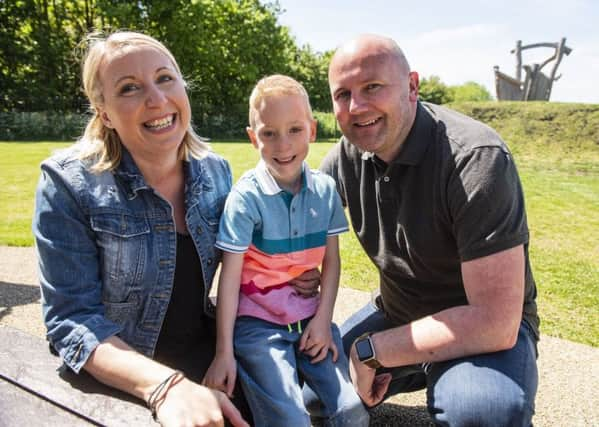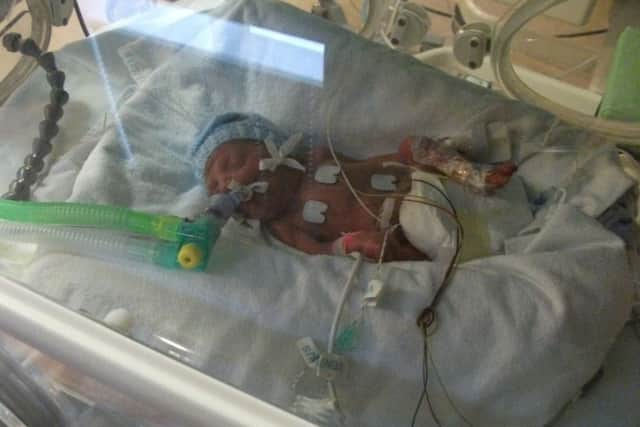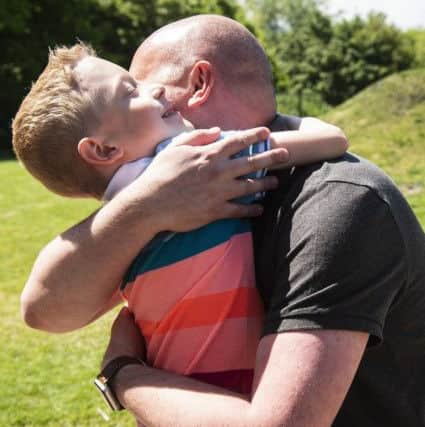Corby dad meets the little boy whose life he saved


Sebastian Cockerill, now six, was born in an emergency caesarean section at 25 weeks. His bone marrow was not mature enough to produce enough red blood cells to keep him alive.
He received several lifesaving blood transfusions, including one with O negative blood from 43-year-old Andrew Spence, of Corby.
Advertisement
Hide AdAdvertisement
Hide AdSeb and mum Helen, 41, from Suffolk, met Andrew at a park in Luton.


Seb gave Andrew a big hug in the playground and presented him with a card that said: ‘To Andrew, thank you for letting me have some of your blood’.
Mum Helen wiped away a tear and showed Andrew photos of Seb when he was born and they both visited the Neonatal Intensive Care Unit at the hospital.
Seb said: “The blood was in Andrew’s veins and it’s gone into my veins. People should go and donate blood and save lives like Andrew did to me.”
Advertisement
Hide AdAdvertisement
Hide AdAndrew, who started donating through work and has given blood more than 30 times, works in digital marketing and is getting married to his partner in July.


Andrew said: “The day was fantastic - what an amazing emotional experience. Seb and his mum Helen were wonderful. He truly is a remarkable young man.
“Being a dad myself, and seeing the premature babies receiving critical care at the neonatal unit, brought it all to life and why being a regular O negative donor is so important.”
Helen said: “Seb was absolutely thrilled to meet Andrew and he has asked a couple of times now when we will see him again. Seb would not have survived without Andrew and the other donors.
Advertisement
Hide AdAdvertisement
Hide Ad“He has completed Year 1 of school. He loves Lego and spending lots of time playing with his friends and cousins. It is so amazing to see after such a frightening start to his life.”
She added: “I don’t think people understand how important O negative blood is. Family members of people who are O neg - please go out and get tested.”
Helen, who is O positive, became a blood donor herself after Seb’s transfusions, and one of her units was subsequently issued to Luton and Dunstable University Hospital.
The long term demand for O negative is mainly being driven by the need to substitute O negative for a rare blood type more common in people of black heritage, called Ro. There is a rise in the number of black people with sickle cell disease with Ro blood who need regular blood transfusions.
Advertisement
Hide AdAdvertisement
Hide AdLast week was National Blood Week and NHS Blood and Transplant is urging its O negative donors to see if family members share the valuable blood type to help meet huge demand from hospitals.
More and more of the total blood issued to hospitals is O negative. New figures, released for National Blood Week, show that it now makes up 14 per cent of all the blood issued to hospitals, despite only eight per cent of the population having O negative blood. This is the highest ever share of NHSBT’s total red blood cell issues.
NHS Blood and Transplant is now asking O negative donors to share their story with their parents, siblings and children, because there is a one in three chance that a family member will be O negative too.
The appeal is targeted at people near the 23 permanent donor centres because the donor centres have more capacity for new donors.
Advertisement
Hide AdAdvertisement
Hide AdO negative blood is particularly valuable because it is the ‘universal donor’ type which can be given to almost anyone, making it especially valuable in emergencies when there is no time to test a patient’s blood type.
There are a variety of clinical factors which mean O negative is often used for newborn and premature babies.